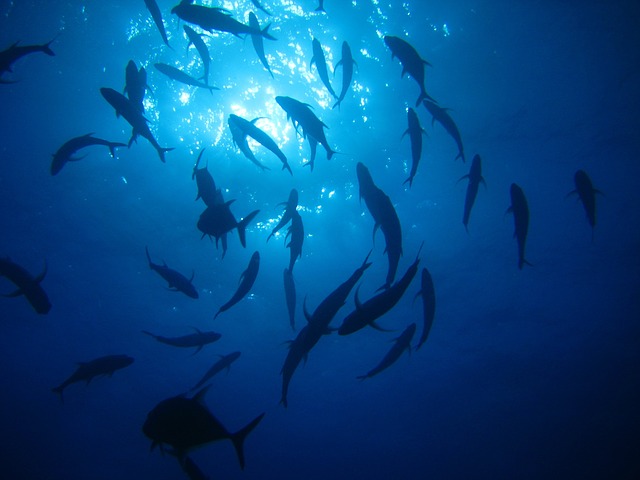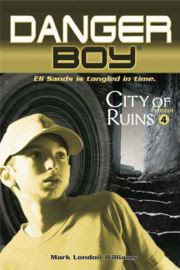The story of our Solar System is developing into one of the most absorbing – and puzzling – epics of contemporary science. At the heart of it lies one of the greatest questions of all – just how special is our own planet, which teems with life and (this is the difficult bit) which has teemed with life continuously through most of its 4.5 billion year lifetime? Not all of the answers are to be found here on Earth.
The post Mars, Pluto… and beyond appeared first on OUPblog.
By Jan Zalasiewicz and Mark Williams
It pays to be nice. One of the most absolutely, emphatically wrong hypotheses about the oceans was coined by one of the most carefree and amiable people in nineteenth century science. It should have sunk his reputation without trace. Yet, it did not. He thought the deep oceans were stone cold dead and lifeless. They’re certainly not that. Even more amazingly, it was clear that the deep oceans were full of life even before he proposed his hypothesis — and yet the idea persisted for decades. He is still regarded as the father of marine biology. There’s a moral in that somewhere.

Edward Forbes was born a Manxman who early developed a love of natural history. He collected flowers, seashells, butterflies with a passion that saw him neglect, then fail dismally in, his studies: first as an artist (he had a fine talent for drawing) then as a doctor. He drifted into becoming some kind of itinerant naturalist who naturally shook things up around him. Going to the British Association meeting in Birmingham, he reacted to the formal atmosphere by decamping to a local pub, the Red Lion, and taking a good deal of the membership with him. There, fueled by beef and beer, they debated the great scientific ideas of the day. They expressed agreement or disagreement with debating points not by a show of hands, but growling like lions and fluttering their coat-tails (Forbes’s technique with the coat-tails was held up as a model for the younger Lions).
In 1841, Forbes was on board a surveying ship, the HMS Beacon, in the Mediterranean. He noticed that as they dredged in deeper waters, the dredge buckets brought up fewer types of marine organism. He extrapolated from that to propose the “azoic hypothesis” — that the deep oceans were dead. It seemed not unreasonable — as one climbs higher up mountains, life diminishes, then disappears. For it to do the same in the oceans would show a nice symmetry. The azoic hypothesis took hold.
The trouble was, even then, commercial ships — with sounding lines far longer than the Beacon’s dredge buckets could go — were occasionally pulling up starfish and other animals from as much as two kilometers down. That should have killed the azoic hypothesis stone dead. But it didn’t. As luck had it, the first reports of such things happened to be sent in by ship’s captains who were either known for telling tall tales or who were plain bad-tempered. They couldn’t compete with Forbes’s eloquence or charm.

It took quite a few years before the weight of evidence finally dragged down the azoic hypothesis. We now know that the Earth’s deep oceans are alive, the thriving communities sustained by a rain of nutrients from above. Edward Forbes’s brainchild is simply one of many of the ideas through which we have gained — tortuously — a better understanding of the Earth’s oceans.
There have been other extraordinary characters, too, involved in this story. The scientists who concocted the inspired lunacy of the American Miscellaneous Society (AMSOC), for example, where every member automatically became a founding member, and where one of the rules was that there were no rules. Crazy as it was, AMSOC led to the Ocean Drilling Program, which revolutionized our knowledge of the deep ocean floors, of the history of global climate and of very much else. It’s also one of the great unsung revolutions of world science — but then there’s much that concerns the oceans that deserves to be more widely known.
There are extraordinary characters involved, too, in the new frontier of ocean science: the oceans that exist, or once existed, on other worlds. There’s the unfortunate Giordano Bruno, who imagined far-off worlds like our own — and who was burned at the stake for expounding these and other heresies. There’s Svante Arrhenius, who, a century ago, got Mars exactly right (no chance of canals, or water, he said) — but got Venus quite wrong (a thoroughly wet planet, he thought, and not the dry baking hell we now know it to be). There’s the wonderful mistake, too, of the contaminated detectors on a spacecraft on Venus — that led to the discovery of the oceans that likely once existed there.
We discover seas on other planets and moons, even as we still try to understand our own Earthly oceans. Just how have they lasted so long? And how will they change — in the next century, and in the next billion years? The story of oceans is really, truly never-ending.
Jan Zalasiewicz is Senior Lecturer in Geology and Mark Williams is Professor in Geology, both at the University of Leicester. They are also co-authors of Ocean Worlds: The story of seas on Earth and other planets.
Subscribe to the OUPblog via email or RSS.
Subscribe to only earth, environmental, and life sciences articles on the OUPblog via email or RSS.
Images: Underwater sea life – Public Domain via Pixabay. Jellyfish – Public Domain via Pixabay
The post The life of oceans: a history of marine discovery appeared first on OUPblog.

Elvin Lim is Assistant Professor of Government at Wesleyan University and author of The Anti-intellectual Presidency, which draws on interviews with more than 40 presidential speechwriters to investigate this relentless qualitative decline, over the course of 200 years, in our presidents’ ability to communicate with the public. He also blogs at www.elvinlim.com. See Lim’s previous OUPblogs here.
The NAACP was doing its job when it accused the Tea Party movement of harboring “racist elements,” but it didn’t necessarily go about it in the most productive way.
All it took was for supporters of the Tea Party movement like Sarah Palin to write, “All decent Americans abhor racism,” and that with the election of Barack Obama we became a “post-racial” society, and the NAACP’s charge was soundly “refudiated.” Or, as Senate Minority Leader, Mitch McConnell put it to Candy Crowley on CNN on Sunday, he’s “got better things to do” than weigh in on the debate. He was elected to deal with real problems, not problems made up in people’s heads. Case closed.
If one has decided not to see something, one won’t see it. (And to be sure, if one has decided to see something, one will always see it. That’s a stalemate.)
I think the NAACP ought to consider the possibility that the residuum of racism that exist today are more thoughts of omission than acts of commission. Racism is a very different beast today than it was on the eve of the Emancipation Proclamation, or on the eve of the Civil Rights Act. Indeed, it is so difficult to detect and even harder to eradicate precisely because it is no longer hidden behind a white conical hood.
Because our standard for what counts as “post-racialism” has gone up with each civil rights milestone, the NAACP should realize that as the old in-your-face racism is gone, so too should the old confrontational techniques of accusation and litigation. Unconscious racism can only be taught and remedied by explanation, not declamation.
To understand unconscious racism, consider the case of Mark Williams of the Tea Party Express, who was expelled by the Tea Party Federation, an organization that seeks to represent the movement as a whole when Williams posted a fictional letter to Abraham Lincoln, saying “We Coloreds have taken a vote and decided that we don’t cotton to that whole emancipation thing. Freedom means having to work for real, think for ourselves, and take consequences along with the rewards.”
The stridently mocking tone of this letter belied a breezy assumption that any and everyone could see that this was a l
 Mark Williams is the author of the DANGER BOY (Candlewick) books, a time-travel series that chronicles the adventures of Eli Sands and his friends. The newest title, DANGER BOY CITY OF RUINS, is set in Ancient Jerusalem. Through Eli’s adventures, readers are taken on an exciting action-packed ride that will thrill kids (and adults) ages 9 and up.
Mark Williams is the author of the DANGER BOY (Candlewick) books, a time-travel series that chronicles the adventures of Eli Sands and his friends. The newest title, DANGER BOY CITY OF RUINS, is set in Ancient Jerusalem. Through Eli’s adventures, readers are taken on an exciting action-packed ride that will thrill kids (and adults) ages 9 and up.
Mark is my SCBWI colleague, and I am thrilled he was willing to share thoughts and insights about his work. Aside from authoring highly acclaimed books, Mark is a columnists for a Hollywood trade paper, and his work has appeared in numerous publications. He is also a Judaic studies teacher at Leo Baeck Temple in West Los Angeles. Most importantly, Mark is the proud dad of two boys who were the inpiration for the Danger Boy books.
In your latest book, DANGER BOY:CITY OF RUINS, Eli travels back in time to Ancient Jerusalem. What inspired you to choose this setting?
Multiple, overlapping reasons: I'm Jewish (well, a lively mix, between mom and dad, of both Jewish and Celtic traditions!), I was sitting in my Sunday school classroom one morning after teaching about the prophets Jeremiah and Huldah, and thinking about ideas for future "Danger Boy" books, but mostly thinking about how rigid adult belief structures, and old inescapable grief, lead to "cities of ruin" for our children. That, plus the fact that particular region was again keeping the world dancing on the edge of the abyss.
How extensive was your research?
Did I get to go to Israel? No. I asked a lot of the Israelis I teach with questions about how the weather feels at certain times of year, what the "air" is like, etc. That and a lot of Internet, a lot of reading, etc.
When writing a time travel story, how concerned must an author be about accuracy?
Being as accurate as you can is the payoff for the stuff you make up -- especially when the "real" history is more incredible than the "storytelling" parts, which is usually the case. And it's also relative -- I had to be really accurate in my "Lewis & Clark book" (DB #3: Trail of Bones), since they all kept journals!
As for Jeremiah and Huldah -- there are no records, outside Tanakh, of family names, any kind of life outside their described mythic roles. Which made it simultaneously easier and harder because they are already large, mythic, etc.
Do you have any advice for authors who are interested in writing time travel stories?
Emphasize the history, over the quantum science. As fascinating and great as the quantum science is. In other words, what's the reason your characters are time traveling in the first place? Where are they going?
Of course, if you have them traveling *ahead,* to a still unchartered future, forget I said anything.
Why did you start writing children's books?
I'd been writing comics and videogame scripts (in the early Jurassic era of the medium), and then became a dad. As I revisited early/mid-90's picture books, there seemed to be a renaissance similar to what comics went through in the 80's! But nothing new appeared to be happening in series fiction, for when readers "graduated" from picture books (never mind that I still like a good Chris van Allsburg offering...)
So I thought, "what if you had a series that was interconnected, somewhat dark, where people aged and came and went -- like in life?" Apparently, I was looking for psychic real estate in the suburbs of J.K. Rowling's zeitgeist, but hadn't heard of Harry Potter when I sat down to start "Danger Boy" (the title coming from my then toddler -- now a teenager -- as he ran up and down the halls one night proclaiming himself, yes, a "Danger Boy!")
However, the year I was shopping chapters and proposals around, the adventures of a certain young British wizard at boarding school took off, and other editors and houses thought, "hey! yeah! darkish interconnected series!" So -- thanks, J.K.!
What are you working on now?
I' m revising the last contracted "Danger Boy" book, "Fortune's Fool," about Shakespeare, Marlowe, the Elizabethans, and their fondness for political intrigue, rendition, torture, etc. (Plus, you know, I get to write about "King Lear.")
And then there's the post "Danger Boy" stuff -- a YA set in Jamaica, a mystery series, still nascent, and, well, another stand-alone, set in the SoCal desert, involving, well, the cosmos again, kinda.
Plus, I'd love to get back into graphic novel writing, and have some feelers out.
What is the best thing about being a children's writer?
It's just such a fun thing to be! I get to write stories about baseball and dinosaurs and Shakespeare and Marlowe and Sacajawea and the secrets of Alexandria, and it's my job!
Well, of course, I have to take on some other jobs, too -- did I mention I teach writing classes?
What is the hardest part about being a writer?
You actually have to sit down and write.
What do you like to read?
I love reading new work by my various colleagues. On a recent panel with Lisa Yee, Kerry Madden, Amy Koss, Cecil Castellucci and Sally Nemeth, I likened the LA YA scene with late 60's rock (well, you know, I couldn't resist) -- i.e., everyone "hearing" each other's work, learning from it, pushing past what's been done, everyone helping amp up everyone's chops, etc.
I read news all the time, online, still read comics, been rereading some Kesey and trying to make new sense of "Sometimes a Great Notion," and lately, on a mini-Cormac McCarthy tear.
Do you have hobbies besides writing?
Watching baseball. Taking long walks, preferably, in wild or semi-wild areas(a.k.a. hiking) whenever possible.
Thanks, Mark! It was a pleasure blog chatting with you. See you in the "future!"
If you would like to know more about Mark,or the adventures of Eli Sands in the DANGER BOY series, check out www.dangerboy.com
Some mornings, you just have to admit that the internet is a strange and wonderful place. The kind of place where people post shout-outs to “missed connections” on Craig’s List about hot women reading good books. In case you were wondering “5′9″ medium to slight build” there are lots of beautiful women reading good books at 35th and Madison (the OUP offices.) Keep reading for a guaranteed morning laugh.
You were reading “The Bottom Billion” on the 2 train on Tuesday - m4w (Midtown West) (more…)
Share This
Rebecca OUP-US
Today we are thrilled to have an original piece from Paul Collier the author of The Bottom Billion: Why the Poorest Countries Are Failing and What Can Be Done About It. Below, Collier a Professor of Economics and Director of the Center for the Study of African Economies at Oxford University, argues that the G8 did not go far enough in its efforts to assist Africa.
Since the 1960s around a billion citizens of the world have been diverging from the rest of us at an accelerating rate, a trend which will generate unmanageable social pressures. Most of these countries are in Africa, and so it is appropriate that the region should again have been on the G8 agenda during the recent summit in Germany. (more…)
Share This





